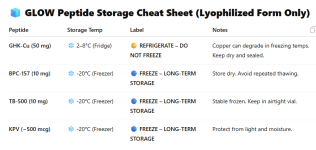I have a question for you guys, I'm finding lots of information on what different peptides do and dosing information. But I'm not finding good information on shelf life and proper storage. I've asked Chat GPT (I know, not always reliable that's why I'm taking it with a grain of salt) about storage and shelf life for semax. Chat GPT says semax is only good for 24 - 48 hrs in the fridge. This can't be right. Shouldn't a whole vial last until it's gone? Is this even the right place to be asking this? Just trying to figure out exactly what to purchase and how much because I don't want my peps going bad and me flushing what little money I have down the toilet.
You are using an out of date browser. It may not display this or other websites correctly.
You should upgrade or use an alternative browser.
You should upgrade or use an alternative browser.
Peptide shelf life
- Thread starter eydiz
- Start date
zpped
Moderator
That chart is both extremely conservative (most peptides last WAY longer in each situation) and also not nuanced enough (i.e. HGH cannot be frozen once, tirz can)
There is no actual answer to your question because every batch can perform different, but the guidelines above are fine. But more importantly, the vendor will sell anything that someone will buy. That should answer this question.Shouldn't a whole vial last until it's gone?
AndyPanda
GLP-1 Specialist
Its only speaking of freezing lyopholized peptides. You shouldn’t be freezing anything that’s been reconstituted. You are 100% correct about HGH but I don’t think the OP is at that level yet.That chart is both extremely conservative (most peptides last WAY longer in each situation) and also not nuanced enough (i.e. HGH cannot be frozen once, tirz can)
There is no actual answer to your question because every batch can perform different, but the guidelines above are fine. But more importantly, the vendor will sell anything that someone will buy. That should answer this question.
Last edited:
zpped
Moderator
You should read that chart again if that's what you think. The last row is frozen reconstitutedIts only speaking of freezing lyopholized peptides. You shouldn’t be freezing anything that’s been reconstituted. You are 100% correct about HGH but I don’t think the OP is at that level yet.
zpped
Moderator
You're the one posting a chart that recommends it...I think you should freeze and thaw all of your liquid peptides, then use them. Everyone else, don’t do that.
AndyPanda
GLP-1 Specialist
It’s been corrected.You're the one posting a chart that recommends it...
AndyPanda
GLP-1 Specialist
I saw this today and now I’m questioning a lot…
“What confuses people is they assume 0c (32f) is the freezing temp, and their freezer is well below that. So despite temp variation of a few degrees, there's no risk of freeze/thaw.
0c is the freezing temp of *pure* water. When there are solutes present, freezing temp is lower. Like salt on road ice.
Realistically that means a freezing temp range of -10c to -60c for almost all peptides.
So if your freezer is set to -20c, but swings between -17c and -22c, and your peptide residual moisture freezes at some temp within that range, like -18c, you're freezing and thawing it multiple times a day, for years.
Without knowing this ice transition temp, essentially impossible. refrigeration is safer as long as the time in storage is reasonably short like a year or so.”
“What confuses people is they assume 0c (32f) is the freezing temp, and their freezer is well below that. So despite temp variation of a few degrees, there's no risk of freeze/thaw.
0c is the freezing temp of *pure* water. When there are solutes present, freezing temp is lower. Like salt on road ice.
Realistically that means a freezing temp range of -10c to -60c for almost all peptides.
So if your freezer is set to -20c, but swings between -17c and -22c, and your peptide residual moisture freezes at some temp within that range, like -18c, you're freezing and thawing it multiple times a day, for years.
Without knowing this ice transition temp, essentially impossible. refrigeration is safer as long as the time in storage is reasonably short like a year or so.”
GLP1Pharmacist
GLP-1 Enthusiast
I have seen some post about not freezing NAD+, anyone have data to suggest refrigerator or freezer?
zpped
Moderator
That person is horribly confused about what they are talking about. Lyophilized peptides cannot be "frozen" or "thawed" because they have no water content. They are already a solid and would require EXTREME heat to transition to a liquid.I saw this today and now I’m questioning a lot…
“What confuses people is they assume 0c (32f) is the freezing temp, and their freezer is well below that. So despite temp variation of a few degrees, there's no risk of freeze/thaw.
0c is the freezing temp of *pure* water. When there are solutes present, freezing temp is lower. Like salt on road ice.
Realistically that means a freezing temp range of -10c to -60c for almost all peptides.
So if your freezer is set to -20c, but swings between -17c and -22c, and your peptide residual moisture freezes at some temp within that range, like -18c, you're freezing and thawing it multiple times a day, for years.
Without knowing this ice transition temp, essentially impossible. refrigeration is safer as long as the time in storage is reasonably short like a year or so.”
Unless they are talking about freezing reconstituted peptides?
nonyabizznez
GLP-1 Specialist
Had me up until "peptide residual moisture". Where are we seeing this exists in lyophilized GLPs? This would defy the definition of lyophilization.
(I had to narrow that down to GLPs because of recent NAD+ that looks more like what you'd find on the rim of a Margarita! 🤣)
(I had to narrow that down to GLPs because of recent NAD+ that looks more like what you'd find on the rim of a Margarita! 🤣)
Calm Logic
GLP-1 Specialist
For me, the problem with refrigeration (compared to freezing) for lyophilized is more potential for moisture from the fridge to get into the vial through any gaps in the vial. I assume no seal is perfect, given enough time anyway. But desiccants near the vial could help.
CokeZro
Recently Joined
I use AI a lot for business and research. ChatGPT is great but sometimes it will hallucinate or give inaccurate replies. If I really want to be more sure I ask other AIs and try to do some in whatever their "Deep search" mode is. Grok has a reality good DeepSearch mode that's free. Forces it to think more thoroughly and it's pretty comprehensive.I have a question for you guys, I'm finding lots of information on what different peptides do and dosing information. But I'm not finding good information on shelf life and proper storage. I've asked Chat GPT (I know, not always reliable that's why I'm taking it with a grain of salt) about storage and shelf life for semax. Chat GPT says semax is only good for 24 - 48 hrs in the fridge. This can't be right. Shouldn't a whole vial last until it's gone? Is this even the right place to be asking this? Just trying to figure out exactly what to purchase and how much because I don't want my peps going bad and me flushing what little money I have down the toilet.
Worth it to double check and do deep searches for important stuff.
christa_channing
GLP-1 Apprentice
I thought I could freeze all of my peptides until I reconstituted them and then ran across a comment that certain ones should not be frozen. I did some research on which are ok to freeze, as I am waiting on a shipment of a few I've never gotten before. I asked Chatgpt if I could freeze my glow and got the ok except for the GHK-cu, which should not be frozen. It's already mixed in, so I guess none of it can be frozen.
Attachments
Last edited:
TooBigtoFail
GLP-1 Enthusiast
When I recon a vial, and is not under a good vacuum, it goes to the garbage. Some vials are better sealed than others, sure, but I cannot predict the future performance of those stoppers, either at -20f or 38f. Is it the cheap plastic stopper or poorly built assembly line, I will never know. I suspect that too many cycles of thaw/freeze, stopper expansion/contractions, will eventually allow air in, and start a contamination cycle. Desiccant or not. Jano has published plenty of notes on the subject. Gray is a gamble. Vial integrity is another.For me, the problem with refrigeration (compared to freezing) for lyophilized is more potential for moisture from the fridge to get into the vial through any gaps in the vial. I assume no seal is perfect, given enough time anyway. But desiccants near the vial could help.
zpped
Moderator
This is incorrect. Anything that is lyophilized is by definition already "frozen". This is in quotes because there is no liquid content to freeze or thaw.I thought I could fereze all of my peptides until I reconstituted them and then ran across a comment that certain ones should not be frozen. I did some research on which are ok to freeze, as I am waiting on a shipment of a few I've never gotten before. I asked Chatgpt if I could freeze my glow and got the ok except for the GHK-cu, which should not be frozen. It's already mixed in, so I guess none of it can be frozen.
I find the chart suggesting that copper can degrade at low temperature funny.


